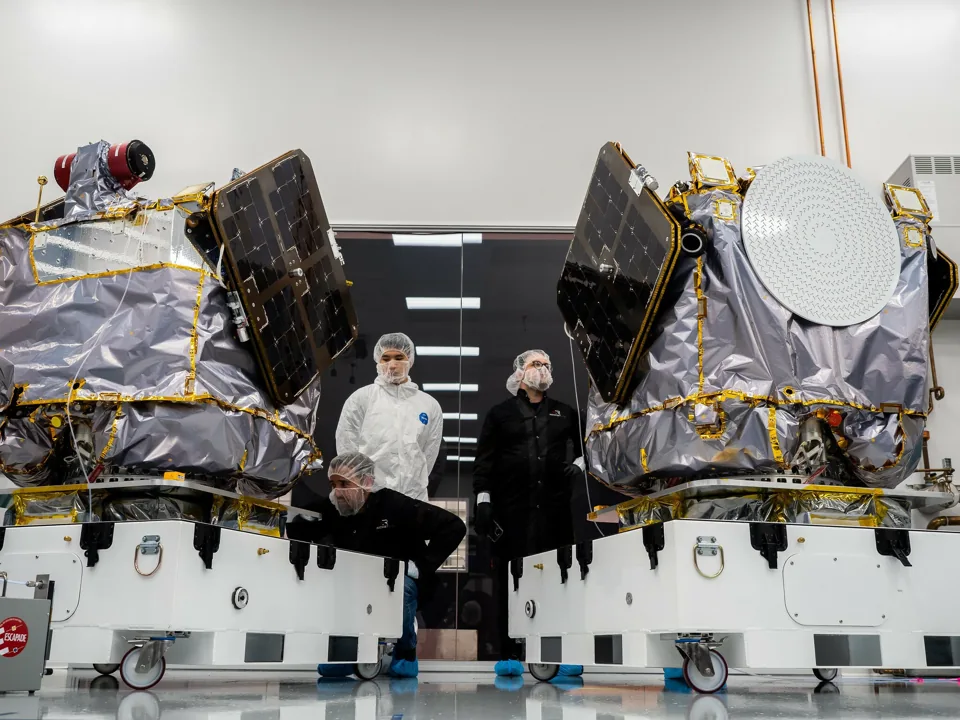A private space company ‘Rocket Lab‘ based in New Zealand will fly to Mars by October 2024. The company has built two spacecraft for the upcoming NASA-funded mission called ‘Escapade‘ – short for Escape and Plasma Acceleration and Dynamics Explorers.
We know that our fiery sun emits waves of radiation during a solar storm. This wave of particles sometimes reaches the Earth and collides with the Earth’s magnetic field and atmosphere, resulting in what we know as auroras. The Earth’s magnetic field shields us from this radiation.
These particle waves can sometimes pass through our solar system. Given our interest in establishing colonies on Mars and upcoming mars missions, we do not have much data on how these energy particles affect Mars.
Scientists have discovered that Mars had an Earth-like atmosphere that could have harboured life millions of years ago. Mars must have looked similar to Earth, covered with lush green mountains, rivers and oceans. But where did it all go? Did a huge solar storm turn Mars into an arid desert? No one knows!
The Escapade mission aims to investigate the effects of solar radiation on Mars. The probes are also equipped with cameras to capture the auroras on Mars in visible light for the first time in human history.
The Escapade mission’s Mars probes, named Blue and Gold about UC Berkeley’s school colours, will launch on Blue Origin’s New Glenn rocket, as the company’s Electron rocket is not powerful enough to carry heavy loads.
The Escapade spacecraft will travel for 11 months to reach Mars.
After that, the probes will take several months to reach the required orbit before beginning their mission in April 2026.
The company’s latest post on the social media platform X, formerly known as Twitter, sheds light on the development of the two space probes and Rocket Lab’s workhouse.
Going to Mars IS awesome!
🛰️ 🛰️ Learn more about the two identical spacecraft designed, built, integrated, and tested by Rocket Lab for @ucbssl and @NASA‘s ESCAPADE mission, from the makers of the Mars spacecraft themselves.
The ESCAPADE mission sets to further unravel the… pic.twitter.com/eh4Tkf7Dax
— Rocket Lab (@RocketLab) August 30, 2024
Rocket Lab is a true underdog in the space industry. In direct competition with Blue-origin, Boeing and SpaceX, Rocket Lab has successfully won a contract for a NASA Mars mission, which is a big deal for a company not founded by a billionaire.
NASA’s Escapade mission had a budget of $80 million and is part of NASA’s Small Innovative Missions for Planetary Exploration (Simplex) program. Rocket Lab built the Martian probes for 57 million dollars in just 3.5 years, which is a huge achievement.
Rocket Lab made its debut in 2018, launching over 190 satellites into orbit with its Electron rocket. The company is also developing a larger launch vehicle called ‘Neutron’ for constellation deployment. The Neutron launcher will make its first flight in 2025.
Rocket Lab has also carried out numerous successful launches since 2018. This, in turn, has led to revenue growth of 71 in the second quarter compared to the previous year, which reached USD 106 million. In the third quarter, the company’s revenue was USD 100 million and USD 105 million, a slight decrease due to a lower absorption of fixed costs for launch services, as investing.com reports in a recent article.
This robust growth is primarily due to the Electron launch vehicle, which is also the third most-launched rocket in the world.
Rocket Lab is led by a humble CEO, Peter Beck, “I’m probably a boring kind of CEO. I don’t post controversial things and I don’t do crazy stuff. I’m just trying to build rockets,” he said in a recent Mashable report. Rocket Lab’s early successes also underscore the important role of private companies in space exploration.

